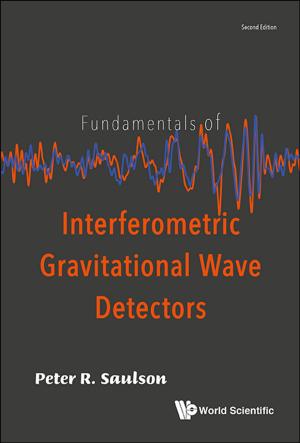Relativistic Density Functional for Nuclear Structure
Nonfiction, Science & Nature, Science, Physics, Nuclear Physics, Relativity| Author: | Jie Meng | ISBN: | 9789814733274 |
| Publisher: | World Scientific Publishing Company | Publication: | January 11, 2016 |
| Imprint: | WSPC | Language: | English |
| Author: | Jie Meng |
| ISBN: | 9789814733274 |
| Publisher: | World Scientific Publishing Company |
| Publication: | January 11, 2016 |
| Imprint: | WSPC |
| Language: | English |
This book aims to provide a detailed introduction to the state-of-the-art covariant density functional theory, which follows the Lorentz invariance from the very beginning and is able to describe nuclear many-body quantum systems microscopically and self-consistently. Covariant density functional theory was introduced in nuclear physics in the 1970s and has since been developed and used to describe the diversity of nuclear properties and phenomena with great success.
In order to provide an advanced and updated textbook of covariant density functional theory for graduate students and nuclear physics researchers, this book summarizes the enormous amount of material that has accumulated in the field of covariant density functional theory over the last few decades as well as the latest developments in this area. Moreover, the book contains enough details for readers to follow the formalism and theoretical results, and provides exhaustive references to explore the research literature.
Contents:
- Concept of Covariant Density Functional Theory (P Ring)
- Relativistic Mean-Field Theory (J Meng, P Ring and P W Zhao)
- Relativistic Mean Field Description of Exotic Nuclei (J Meng, P Ring, P W Zhao and S G Zhou)
- Relativistic Hartree–Fock–Bogoliubov Theory: Ground States and Excitations (W H Long, J Meng and N Van Giai)
- Superheavy Nuclei and Fission Barriers (B N Lu, J Zhao, E G Zhao and S G Zhou)
- Relativistic Symmetries in Nuclear Single-Particle Spectra (J Y Guo, H Z Liang, J Meng and S-G Zhou)
- Structure of Hypernuclei in Relativistic Approaches (K Hagino and J M Yao)
- Rotating Nuclei: From Ground State to the Extremes of Spin and Deformation (A V Afanasjev)
- Novel Rotational Excitations (J Meng, S Q Zhang and P W Zhao)
- Small Amplitude Motion (N Paar and Y Niu)
- Nuclear Shell Structure and Response with Quasiparticle-Vibration Coupling (E Litvinova and P Ring)
- Beyond the Relativistic Mean-Field Approximation — Collective Correlations (Z P Li, T Nikšić, D Vretenar and J M Yao)
- Heavy Element in Astrophysical Nucleosynthesis (B H Sun and Z M Niu)
- Relativistic Density Functional Theory for Finite Nuclei and Neutron Stars (J Piekarewicz)
- Relativistic Versus Non-Relativistic Mean Field (P-G Reinhard)
Readership: Graduate students in nuclear physics, nuclear physicists; theoretical physicists interested in the study of quantum many body problems.
Key Features:
- This book focuses on the covariant version of density functional theory, summarizes the latest developments as well as the enormous amount of material that has accumulated over the last few decades, and provides a comprehensive overview of its development and applications for nuclear structure
- This book contains enough details for a beginner in nuclear physics to follow the formalism and theoretical results, and provides exhaustive references to explore the research literature
- The authors include all the experts in this field including many world-leading scientists from China, Europe, Japan, and United States
This book aims to provide a detailed introduction to the state-of-the-art covariant density functional theory, which follows the Lorentz invariance from the very beginning and is able to describe nuclear many-body quantum systems microscopically and self-consistently. Covariant density functional theory was introduced in nuclear physics in the 1970s and has since been developed and used to describe the diversity of nuclear properties and phenomena with great success.
In order to provide an advanced and updated textbook of covariant density functional theory for graduate students and nuclear physics researchers, this book summarizes the enormous amount of material that has accumulated in the field of covariant density functional theory over the last few decades as well as the latest developments in this area. Moreover, the book contains enough details for readers to follow the formalism and theoretical results, and provides exhaustive references to explore the research literature.
Contents:
- Concept of Covariant Density Functional Theory (P Ring)
- Relativistic Mean-Field Theory (J Meng, P Ring and P W Zhao)
- Relativistic Mean Field Description of Exotic Nuclei (J Meng, P Ring, P W Zhao and S G Zhou)
- Relativistic Hartree–Fock–Bogoliubov Theory: Ground States and Excitations (W H Long, J Meng and N Van Giai)
- Superheavy Nuclei and Fission Barriers (B N Lu, J Zhao, E G Zhao and S G Zhou)
- Relativistic Symmetries in Nuclear Single-Particle Spectra (J Y Guo, H Z Liang, J Meng and S-G Zhou)
- Structure of Hypernuclei in Relativistic Approaches (K Hagino and J M Yao)
- Rotating Nuclei: From Ground State to the Extremes of Spin and Deformation (A V Afanasjev)
- Novel Rotational Excitations (J Meng, S Q Zhang and P W Zhao)
- Small Amplitude Motion (N Paar and Y Niu)
- Nuclear Shell Structure and Response with Quasiparticle-Vibration Coupling (E Litvinova and P Ring)
- Beyond the Relativistic Mean-Field Approximation — Collective Correlations (Z P Li, T Nikšić, D Vretenar and J M Yao)
- Heavy Element in Astrophysical Nucleosynthesis (B H Sun and Z M Niu)
- Relativistic Density Functional Theory for Finite Nuclei and Neutron Stars (J Piekarewicz)
- Relativistic Versus Non-Relativistic Mean Field (P-G Reinhard)
Readership: Graduate students in nuclear physics, nuclear physicists; theoretical physicists interested in the study of quantum many body problems.
Key Features:
- This book focuses on the covariant version of density functional theory, summarizes the latest developments as well as the enormous amount of material that has accumulated over the last few decades, and provides a comprehensive overview of its development and applications for nuclear structure
- This book contains enough details for a beginner in nuclear physics to follow the formalism and theoretical results, and provides exhaustive references to explore the research literature
- The authors include all the experts in this field including many world-leading scientists from China, Europe, Japan, and United States















